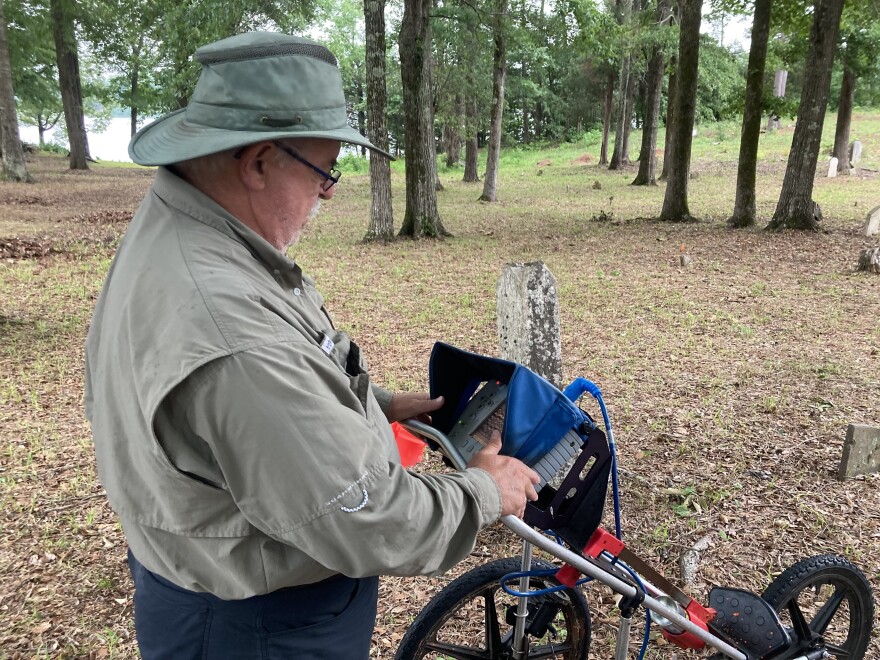Murrow Award for Best Writing. "No Stone Unturned: Preserving Slave Cemeteries in Alabama." Alabama Public Radio
Alabama voters headed to the polls in November for the 2022 midterms. One issue on the ballot was abolishing slavery in the state 157 years after Congress outlawed the practice nationally. Even a “yes” vote in Alabama won’t erase one lasting impact of the slave trade before the U.S. Civil War
“Knowing this cemetery is there, and it is just dwindling away, it’s just being washed away. It’s just thrown away. It’s like taking my grandfather, my great grandfather, or father or my mother and knowing that they’re buried there, and just trashing them,” said Patricia Kemp of Tuscaloosa.
Please find enclosed Alabama Public Radio’s entry for the 2022 Edward R. Murrow Award for Best Writing, titled “No Stone Unturned: Preserving Slave Cemeteries in Alabama.”
Please click here to listen to the program and review the script
https://www.apr.org/news/2022-10-06/no-stone-unturned-preserving-slave-cemeteries-in-alabama-an-apr-news-series
Following the passage of the 13th amendment to the U.S. Constitution in 1865, an estimated 435,000 slaves in Alabama were freed. Many of these people remained in the state to live out their lives. Their descendants now say they can’t find the burial sites of their ancestors and these cemeteries are slowly disappearing. Some are lost to neglect while others are being paved over by developers.
Alabama Public Radio spent nine months, with no budget, investigating the effort to find and preserve slave burial grounds in the state. We heard from the families of some of these kidnapped Africans. They say the system that reduced their great-great grandparents to nameless property creates the nearly impossible job of tracing their family roots. That’s a situation not shared by their white neighbors.
We started with forty unmarked graves.
APR began its search at a two acre spot known as the “Old Prewitt Slave Cemetery,” set up by plantation owner John Welch Prewitt in Northport, near Tuscaloosa. Only a handful of tombstones and faded burial markers remains. The news team invited Len Strozier of Omega Mapping Services in Fortson, Georgia to scan Old Prewitt with ground penetrating radar. He found an unmarked grave within a minute, and a total of forty within an half hour.
“Knowing this cemetery is there, and it is just dwindling away, it’s just being washed away. It’s just thrown away. It’s like taking my grandfather, my great grandfather, or father or my mother and knowing that they’re buried there, and just trashing them,” said Patricia Kemp of Tuscaloosa.
Please find enclosed Alabama Public Radio’s entry for the 2022 Edward R. Murrow Award for Best Writing, titled “No Stone Unturned: Preserving Slave Cemeteries in Alabama.”
Please click here to listen to the program and review the script
https://www.apr.org/news/2022-10-06/no-stone-unturned-preserving-slave-cemeteries-in-alabama-an-apr-news-series
Following the passage of the 13th amendment to the U.S. Constitution in 1865, an estimated 435,000 slaves in Alabama were freed. Many of these people remained in the state to live out their lives. Their descendants now say they can’t find the burial sites of their ancestors and these cemeteries are slowly disappearing. Some are lost to neglect while others are being paved over by developers.
Alabama Public Radio spent nine months, with no budget, investigating the effort to find and preserve slave burial grounds in the state. We heard from the families of some of these kidnapped Africans. They say the system that reduced their great-great grandparents to nameless property creates the nearly impossible job of tracing their family roots. That’s a situation not shared by their white neighbors.
We started with forty unmarked graves.
APR began its search at a two acre spot known as the “Old Prewitt Slave Cemetery,” set up by plantation owner John Welch Prewitt in Northport, near Tuscaloosa. Only a handful of tombstones and faded burial markers remains. The news team invited Len Strozier of Omega Mapping Services in Fortson, Georgia to scan Old Prewitt with ground penetrating radar. He found an unmarked grave within a minute, and a total of forty within an half hour.

Pat Duggins
